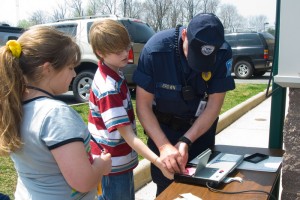Leading the next generation of survivors
Anna chooses to believe that the one person who loved her more than life died in the fire that left her, at three years old, badly injured and without a home. The next seven years, and many placements in Chicago’s foster care system, convinced her that the pillowcase stuffed with her few possessions was the only constant in her life.
Although she was finally adopted at 12 by a loving Christian family who wanted to nurture and protect her, Anna chafed in true 12-year-old form at some of their restrictions, like “don’t eat candy”! She solved that problem by hanging out at the corner store where her allowance could satisfy her sweet tooth. But something else was at the corner store, a new friend who always bought her a candy and sometimes a little gift. As the months went on she shared her fear that her adoptive parents might give her back, just as every foster parent had. Over the next six months he became her best and only friend—someone she could trust, someone she could call when the inevitable “pack up your pillowcase” moment came. He had given her a pager for such an emergency.
And the day came when 13-year-old Anna had a fight with her mom; she paged her new friend. Within minutes, he showed up at the corner store and she got in his car.
Anna had stepped off an enormous cliff that can only be seen when looking back. Her friend became her master. He introduced her to violent sex acts and the language to describe them to get her ready for the market into which she would be placed. He gave names to the things he had done to her and told her how to describe the acts she was to offer the men who would pull up beside her on the street or who would be waiting behind the door when she was delivered to a hotel or truck stop. Out of her mouth came the words that assured the buyer she was like the girl he had seen on the porn he devoured, convincing him that this “barely legal” girl loved to do the things he fantasized. She spoke the language! She couldn’t possibly be innocent like his daughter or granddaughter…
Anna’s pimp moved her out of Chicago and then back again, to be part of a stable of a dozen other girls. They were managed ruthlessly by an older girl, “the Bottom Ho,” who he had trained since she was 12. She knew how to take care of business while he was out. When the casinos and convention cities had to be “stocked” for special events where patrons would be seeking young girls, the whole stable was moved to the market. By her sixteenth birthday, Anna had traveled more and seen less than most people would in a lifetime.
Through it all, she never thought of running. The violence and beatings were terrifying, but when he was sweet to her and gave her attention and presents, she believed he really cared about her. Besides, Daddy (that’s what he said she must call him) was her protection from the other pimps and violent buyers and she knew that crossing him meant something dreadful would happen to her mother—he promised. Everything Daddy said appeared to be true. He told her police arrest ‘hos’ like her and she would go to jail. He said men like him rarely go to jail and if they do, they get out in days. If she talked police, he would get her, and her fate would be worse than anything she had experienced so far. Sure enough, she was arrested—not Daddy, and surely not the john. She learned quickly to lie to the police, serve her time, and find a way to call her pimp once they released her. If she was arrested and placed in a shelter or group home she was out the back door the first night.
At one point, early in her captivity, Anna sneaked a call home for help. Her older adopted brother answered the phone and after listening to her plea for help he told her “you made your bed now sleep in it” and hung up. Thinking that he represented her parents too, Anna knew her fate was sealed. Not even the pillowcase this time…
The story of Anna’s escape from this life is one that space in this letter does not allow, but she did finally escape!
Her parents had never stopped looking for her. When they were finally reunited, Anna went to Washington, D.C. where her mother lived to care for her in her last days. Her mother embraced her fully and helped Anna establish a survivor’s ministry to help other victims of sexual slavery.
Anna runs an outreach program and drop-in center for vulnerable and victimized youth. As Shared Hope creates a restorative shelter network around the nation, survivors like Anna are the leaders who can teach us to protect and minister to this uniquely precious group of God’s children.
 Stories like this are far too common because adequate criminal investigation and prosecution techniques may not be permitted under state law. However, some organizations have taken measures to assist in the search for missing children. Child Safety Network, Klaas Kids Foundation, and the National Center for Missing and Exploited Children all emphasize the need for parents to have an identification card for their child in case the child goes missing. These cards can be given to law enforcement and entered into the database to assist in finding the minor.
Stories like this are far too common because adequate criminal investigation and prosecution techniques may not be permitted under state law. However, some organizations have taken measures to assist in the search for missing children. Child Safety Network, Klaas Kids Foundation, and the National Center for Missing and Exploited Children all emphasize the need for parents to have an identification card for their child in case the child goes missing. These cards can be given to law enforcement and entered into the database to assist in finding the minor. This is not a story of rescue, restoration, or ultimately, justice.
This is not a story of rescue, restoration, or ultimately, justice.





